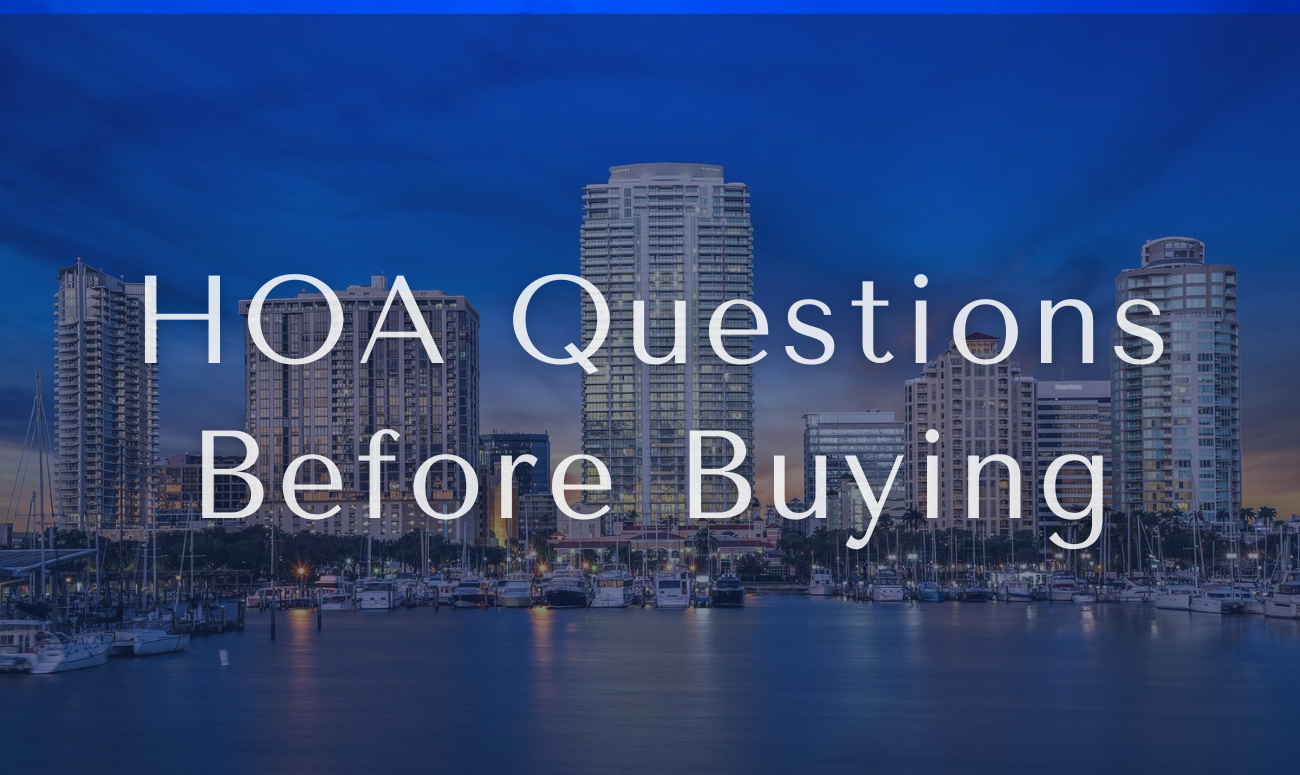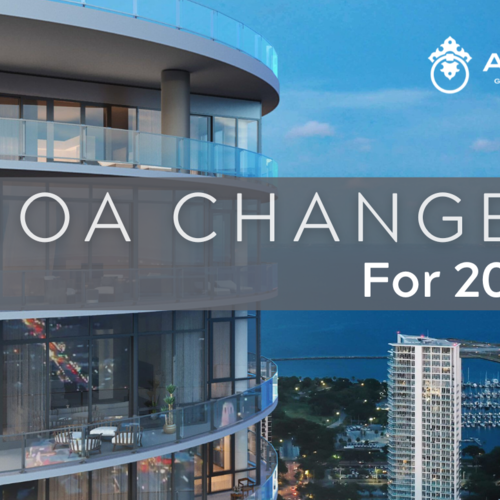HOA Questions Before Buying: Understanding Homeowners Association Fees in Florida
When purchasing property in a Florida homeowners association (HOA), prospective buyers should educate themselves on HOA fees. These monthly or annual payments fund the maintenance of shared community amenities and enforce standards that protect property values. In essence, HOA fees are investments in your community’s upkeep and future.
Additionally, the fees ensure common areas stay well-maintained and amenities function optimally so residents can fully enjoy them. By understanding what these charges encompass, buyers can determine if a community aligns with their lifestyle and budget. Let’s explore some key aspects of HOA fees.
HOA Questions Before Buying: What Exactly Are HOA Fees?
Simply put, HOA fees refer to recurring charges paid by homeowners to fund the HOA’s expenses. Specifically, these dues cover daily maintenance, long-term repairs, improvements, and operation of communal amenities like pools, parks, clubhouses, and parking garages. The collected money finances the workforce and materials to keep these shared spaces functional and appealing.
Moreover, associations utilize HOA fees to provide services benefitting the whole community, including security, garbage collection, and cable TV. The range of covered benefits depends on what the governing documents outline. Reviewing the CC&Rs (covenants, conditions and restrictions) during the buying process is advisable.
HOA Questions Before Buying: What Do HOA Fees Cover in Florida?
In Florida, HOA fees often encompass costs for landscaping, waste management, community security, insurance policies, recreational amenities, and concierge staff. However, the scope varies across associations depending on the amenities and services offered.
For instance, a luxury high-rise with a pool, gym, golf course and 24/7 security requires substantially higher fees than a small townhouse complex offering just basic maintenance of shared green spaces. Understanding precisely what is covered allows buyers to assess if the dues provide good value.
HOA Questions Before Buying: How Much Are HOA Fees in Florida?
According to the 2022 HOA Report from Community Association Insights, the average annual HOA assessment per unit in Florida is $2,241. However, evaluations of individual communities show significant variation based on factors like location, size, amenities, and service extent.
A 2022 Florida HOA & Condo Association Survey Report by Association Reserves Florida notes the lowest quarterly HOA fees were $153 while the highest were $3,533. Generally, newly constructed communities and those offering more amenities and services levy higher fees.
HOA Questions Before Buying: Do HOA Fees Go Up in Florida?
In Florida, HOA fees often increase year to year, mainly to offset rising operational expenses. As inflation drives up community management costs, associations must raise rates to maintain service levels.
However, by law, boards cannot impose fee hikes without properly notifying homeowners. The process involves sending letters about the proposed changes, holding open meetings for resident feedback and voting on alterations. Understanding these regulatory measures for increasing fees enables buyers to anticipate and prepare for higher dues.
HOA Questions Before Buying: What Factors Drive Up Florida HOA Fees?
In Florida, inflation, expanding amenity offerings, aging infrastructure and natural disasters commonly force increases in HOA fees over time. As expenses rise to counter these impacts, associations collect more from homeowners to cover ballooning costs.
For example, associations located along Florida’s coastline often face spiking insurance premiums due to intensifying hurricane risks. To afford surging annual policy renewals, these HOAs levy special assessments or boost regular fees. By pinpointing the variables elevating fees in a particular community, prospective residents gauge future expectations.
HOA Questions Before Buying: How are HOA Fees Determined in Florida?
According to Florida law, HOA boards oversee yearly budgeting processes establishing that year’s fee rate. These budgets account for recurring community expenses like staff payroll, property taxes, amenity upkeep, insurance, and savings contributions. The boards divide total costs by the number of homeowners, determining the fee each party must pay.
Additionally, before finalizing and enacting new budgets, boards legally must distribute proposals to all members and hold meetings allowing discussion. This system aims to make rate determinations transparent while providing homeowners opportunities to provide input.
HOA Questions Before Buying: What Maintenance Do HOA Fees Cover in Florida?
In Florida communities, HOA fees classically cover upkeep of amenities like clubhouses, pools, tennis courts, playgrounds and landscaping.
Depending on the association’s governing documents, dues may also fund maintaining components of individually owned residences. For example, some attach mandatory maintenance responsibilities for roofs, exterior walls, windows, decks, patios or driveways to HOA fees.
Confirming these details determines whether you or the community retain certain home maintenance costs. It also provides for accurately budgeting required home repairs and replacements.
HOA Questions Before Buying: Do HOA Fees Cover Home Insurance in Florida?
Typically, HOAs do not utilize collected fees to cover homeowners insurance policies within Florida communities. Responsibility for arranging and funding individual property insurance policies lies with each resident.
However, some associations do secure master policies offering extra coverage options to homeowners. For instance, they may utilize HOA fees to provide windstorm or flood coverage supplementary to owners’ existing homeowners policies. Investigating these choices can support securing complete, affordable coverage.
HOA Questions Before Buying: What Maintenance Don’t HOA Fees Handle in Florida?
While HOA fees finance caring for community common areas, they do not classically cover maintaining components within individually owned residences. Unless specified under unique rules, owners retain obligations for aspects like:
– Interior maintenance (e.g. appliances, flooring, systems)
– Fenced yard upkeep
– General household repairs
– Utility costs
Verifying exempted maintenance liabilities before purchasing allows for budgeting mandatory home improvement funds. It also prevents misunderstanding HOA coverage terms after moving in.
HOA Questions Before Buying: Can HOAs Impose Special Assessments in Florida?
Florida law grants HOA boards authority to levy special assessments when budgeted funds cannot address significant, urgent or unforeseen community expenses.
These one-time fees provide financial resources for costlier projects like amenity additions, disaster repairs or overdue infrastructure replacements exceeding reserve balances. HOAs impose the charges on all homeowners, usually payable in lump sums or multi-month installments.
While useful for enabling vital community investments, special assessments also carry risk for residents. These abrupt extra payments could greatly disturb family budgets and financial plans. Checking a community’s assessment history and reserve funding levels paints a useful picture of future likelihood.
HOA Questions Before Buying: What Are Reserve Funds for Florida HOAs?
HOA reserve funds act as savings accounts earmarking cash for future community repairs and replacements. Associations direct portions of regular fee payments into these reserves to reduce needs to levy special assessments addressing expensive maintenance projects.
Florida Statute 720 mandates HOAs budget adequate reserves facilitating necessary capital enhancements like roof replacements or road resurfacings. Following minimum state benchmarks for reserving ensures communities avoid unnecessarily imposing special payments on residents.
HOA Questions Before Buying: Do All Florida HOAs Maintain Reserve Funds?
While reserving for future expenditures is an HOA best practice, Florida law does not universally require associations to maintain dedicated reserves. The state reserves mandate only applies to mandatory homeowners associations, mainly overseeing single-family home communities.
Other association types like those governing condos and co-ops do not fall under the statute’s purview. However, given reserves’ financial benefits, many still elect to establish and sufficiently fund reserves without legal obligation. Discovering an association’s reserving approaches provides useful financial insight.
HOA Questions Before Buying: Can You Pay HOA Fees with a Credit Card in Florida?
Acceptable HOA fee payment methods differ across Florida communities. While most associations allow paying by check or electronic bank transfer, some also accommodate using credit/debit cards.
Processing companies like CiraSync and PayHOA provide credit card payment systems to associations for member convenience. However, communities absorbing merchant fees on card transactions may tack on surcharges to cover added costs.
Checking on available assessment payment options ensures selecting comfortable, budget-friendly methods. Where credit cards are welcomed, members also may benefit from accumulating points/cashback rewards.
HOA Questions Before Buying: What Are Late Fees and Interest for Overdue Florida HOA Dues?
Most Florida HOAs enforce financial penalties to discourage homeowners defaulting on HOA payments. While specific charges vary, associations commonly issue late notices, impose recurring late fees, and levy escalating interest on overdue account balances.
For example, an HOA may charge $25 monthly late fees after a 10-day grace period while also applying 12% APR interest on unsettled arrearages. Understanding these repercussions helps incentive properly budgeting for and promptly paying HOA assessments as they come due.
HOA Questions Before Buying: Can HOAs Foreclose for Unpaid Fees in Florida?
Under Florida law, HOAs hold right to foreclose on properties whose owners become significantly delinquent paying their HOA assessments. After issuing repeat late notices and allowing reasonable opportunity to address overdue balances, associations can take mortgage-like liens against homes.
If owners still fail to become current on owed sums, Florida HOAs then may force sales of liened units through foreclosures. Having homeownership extinguished undoubtedly represents an absolute worst-case outcome for avoiding dues obligations.
HOA Questions Before Buying: What Steps Precede FL HOA Foreclosures?
Before Florida HOAs can legally foreclose, statute mandates specific notification processes informing owners of escalating arrearages and risks. First, boards must mail overdue balance letters allowing at least 45 days for responses.
If deficiences continue, associations deliver intent to file lien notices providing an added 30 days for resolution. Only then may HOAs file lien certificates if account issues persist. More notifications precede initiating actual foreclosure lawsuits.
This graduated notice sequence aims to promote resolution while protecting owners against surprise extreme actions. It underlines the scale of consequences stemming from unresolved HOA delinquencies.
HOA Questions Before Buying: Can HOA Boards Make Exceptions to Rules in Florida?
Florida HOA boards retain powers to selectively waive or adapt enforcement of community policies and fee-related rules. For instance, association leaders may choose extending payment deadlines, decreasing or forgiving late charges, or altering required methods for overdue homeowners facing exceptional hardships.
However, boards also must balance compassion with consistency to avoid claims of unfairness or precedent-setting. Consulting counsel helps ensure any accommodations align with state laws and governing documents provisions.
Documenting approved exceptions also prevents subsequent boards from reversing decisions. Overall though, HOA boards focus first on treating all members equitably under association guidelines.
HOA Questions Before Buying: Conclusion
Gaining working awareness of the purpose and structure of HOA fees facilitates evaluating if a given Florida community suits your lifestyle and budget. These recurring charges become unavoidable requirements for obtaining residence within association-governed neighborhoods.
Checking fee transparency, reserve funding strategies, and accounts receivable policies paints useful pictures of how financially responsible and resilient an HOA operates. Clarity on what is covered and the process for increasing dues enables accurately projecting affordability.
While not always exciting, understanding HOA fees leads to better-informed property purchasing and enhanced community living experiences. It represents essential due diligence for stewarding significant home investments.
If you are looking for a Realtor In St Petersburg Fl visit https://avalongrouptampabay.com/




